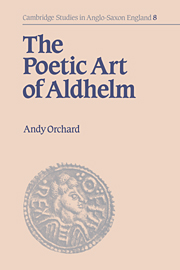Book contents
- Frontmatter
- Contents
- List of tables
- Preface
- List of short titles and abbreviations
- Sigla of scholars cited
- 1 Aldhelm's life and verse
- 2 Aldhelm and the Anglo-Latin octosyllable
- 3 Aldhelm's hexameter verse style and its origins
- 4 Aldhelm's remembered reading in verse
- Appendix 4.1 Parallel diction in Aldhelm's sources
- 5 After Aldhelm: the Anglo-Latin legacy
- Appendix 5.1 Parallel diction in Aldhelm's Anglo-Latin heirs
- Appendix 5.2 A statistical survey of Anglo-Latin verse
- Bibliography
- Index
4 - Aldhelm's remembered reading in verse
Published online by Cambridge University Press: 23 November 2009
- Frontmatter
- Contents
- List of tables
- Preface
- List of short titles and abbreviations
- Sigla of scholars cited
- 1 Aldhelm's life and verse
- 2 Aldhelm and the Anglo-Latin octosyllable
- 3 Aldhelm's hexameter verse style and its origins
- 4 Aldhelm's remembered reading in verse
- Appendix 4.1 Parallel diction in Aldhelm's sources
- 5 After Aldhelm: the Anglo-Latin legacy
- Appendix 5.1 Parallel diction in Aldhelm's Anglo-Latin heirs
- Appendix 5.2 A statistical survey of Anglo-Latin verse
- Bibliography
- Index
Summary
That it was an important part of Aldhelm's hexameter verse technique to borrow and rework the remembered poetic diction of previous authors has already been made clear; the precise range of Aldhelm's verse sources needs now to be more narrowly determined, to help assess the ways in which Aldhelm refashioned those sources after his own idiosyncratic poetic pattern. The search for Aldhelm's Latin poetic sources is not new. It is over a century since Manitius published his monumental study of Aldhelm's borrowings, and in the intervening years a number of other scholars have readjusted the canon of Aldhelm's perceived poetic sources both by the addition and subtraction of relevant works to Manitius's already lengthy list.
Aldhelm provides the first and most important witness to the state of learning in early Anglo-Saxon England, and accurate assessment of the library at his disposal sheds useful light on both his working methods and the extent of his original contribution. With regard to Aldhelm's Latin metrical verse, the scholar has a number of advantages in the search for sources. The first of these is the fact that Aldhelm was the author of two treatises on the Latin hexameter, De metris (DM) and De pedum regulis (DPR), in the course of which he quotes widely from a great range of sources. A second aid to the source-hunter is provided by Aldhelm's own highly idiosyncratic technique of poetic composition, in which excerpted metrical phrases from previous poets are combined and refashioned in a fairly limited number of ways, as has been shown above.
- Type
- Chapter
- Information
- The Poetic Art of Aldhelm , pp. 126 - 224Publisher: Cambridge University PressPrint publication year: 1994



